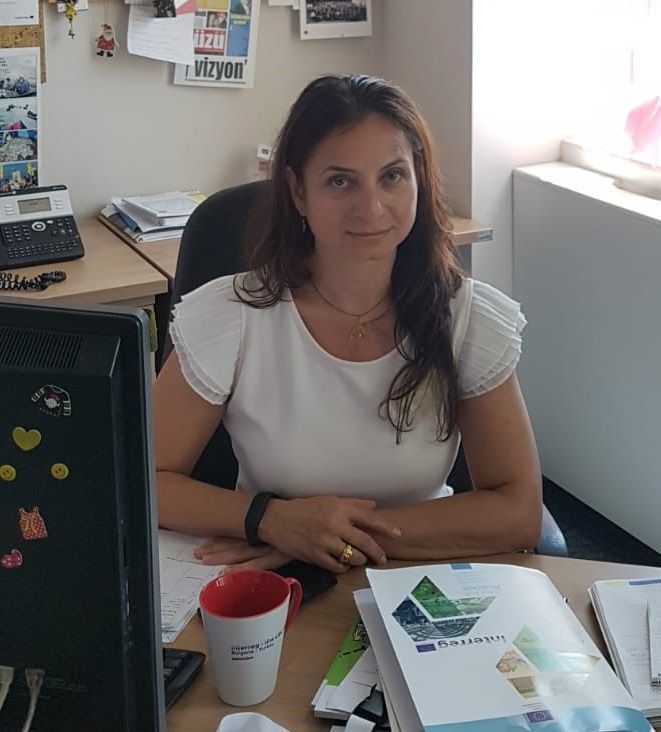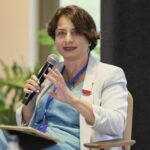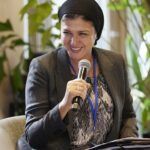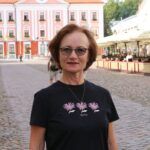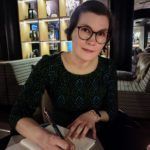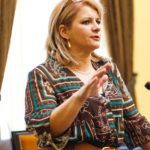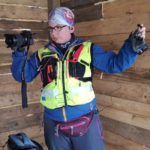Voices from the field
Şebnem Sözer
"We replace historical prejudices with friendship and mutual benefits"
I live in Ankara, which is not located in a border region. However, since I was a child, I have always felt excited about crossing borders, be it crossing a river, a bridge or any basin, and contacting other cultures. I can say I have found my dream job when I was assigned to cross-border cooperation.
The Black Sea Basin Programme is important for Turkey as we have the largest eligible area and the coastline makes up our entire northern shore at the Black Sea. Local entities have the opportunity to cooperate with their counterparts from the neighbouring countries and share experience.
I started working for CBC in 2006. Since 2010, I have been working as the coordinator of the CBC department within the Directorate for Financial Cooperation, Ministry for EU Affairs of Turkey. This section of the Ministry is the National Authority for the CBC Programmes in Turkey. Currently, we are participating in two programmes namely, Interreg IPA CBC Bulgaria-Turkey and ENI CBC Black Sea Basin.
I had the chance to participate in the very beginnings of CBC for the preparations of the 2007-2013 period. I remember that all institutions were unfamiliar with this new instrument. It was very challenging to fulfil the tasks as a member of the Joint Task Force and later as the National Authority. CBC tasks were then carried out by two people in my Ministry. We are now a team of eleven, responsible for two CBC Programmes which shows the importance it has for our country.
Back to 2007, as a negotiating candidate country, Turkey participated in ENPI Black Sea Basin CBC Programme with different set of rules, subject to IPA. This gave the National Authority and the Implementing Agency more extended managerial roles than other participating countries. Trying to comply with ENPI and IPA rules simultaneously was a challenge as this practice had no precedence. But this challenge gave our team extensive experience. We kept our projects always at a short distance, assisted them, monitored them closely which enabled us to literally work as the JTS also. This has been rewarding because CBC is a lot of work; so much office work, so many meetings and daily correspondence with the beneficiaries. But when you go to the programme area to visit a project and see the results, you feel all your efforts actually mean something and that you have touched lives of others. It is indeed a great satisfaction.
If I were to name some projects implemented under the ENPI Black Sea Basin Programme, very good examples come to my mind. Two of them are OLKAS and LIMEN projects from the first and second call for proposals respectively. The second one is the continuation of the first and both are real CBC projects with many partners. The aim of the “OLKAS” project is the promotion of the medieval city – ports of the Black Sea and the cultural heritage preserved in them, in order to contribute to the development of the cultural tourism of the area (www.olkas.net), and the aim of LIMEN project is to contribute to the development of cultural tourism in the wider region of the Black Sea (www.limenproject.net).
I believe cross-border cooperation is more than just about the outputs and results of projects. It creates a practice of working together with the institutions of neighbouring countries. Not disregarding the positive impacts of each project, I believe CBC serves a higher purpose: bringing together societies which may have developed historical prejudices and replacing them with friendship, peace and mutual benefits.
Şebnem Sözer has graduated as an architect from Faculty of Architecture, Middle East Technical University in Ankara in 1991. Between 1995-2000, she studied Contemporary Greek Language and Literature in the Faculty of Letters, History and Geography, at the University of Ankara. Between 2003-2006 she had her master’s degree in Science and Technology Policies, Middle East Technical University in Ankara, with focus on intellectual property rights. Between 2008-2016, she had her PhD studies at the Department of Sociology, Middle East Technical University in Ankara, focusing on urban sociology.
After her practice as an architect in a private office, she started working for the Ministry of Industry (1992-2006) as an architect, later as site selection expert, later head of department for industrial zones. In 2006, she started to work for the Secretariat General for EU Affairs (later turned to the Ministry for EU Affairs), the NIPAC Office and National Authority for CBC Programmes. She now continues her post as the coordinator of the CBC Department in the Ministry.
